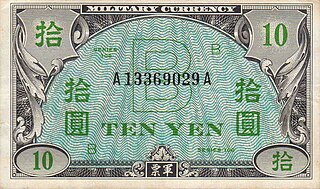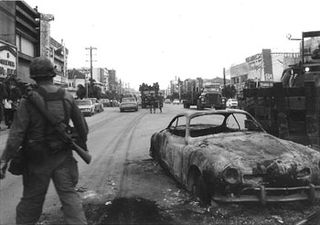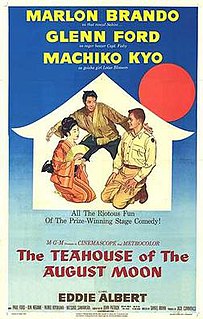 W
WB yen was a colloquial term used to refer to a form of military scrip used in post-war US-Occupied Okinawa from April 15, 1946, to September 1958. Officially, it was called B type military scrip .
 W
WPaul Wyatt Caraway was a United States Army Lieutenant General and the 3rd High Commissioner of the United States Civil Administration of the Ryukyu Islands. He was the son of two influential Arkansas Senators, Hattie Caraway and Thaddeus Caraway. Caraway graduated from the United States Military Academy in 1929. He also graduated from Georgetown University with a law degree and taught law at West Point. He served on the General Staff for the United States Department of War before becoming deputy chief-of-staff to General Albert Coady Wedemeyer during World War II. He served in numerous other positions, including accompanying Vice President Richard Nixon on a tour of Asia. Following the Korean War, he became head of Army Research and Development. He never saw combat.
 W
WFar East Command (FECOM) was a unified combatant command of the United States Department of Defense, active from 1947 until 1957, functionally organised to undertake the occupation of Japan and Korea. The 1st and 6th Marine Divisions, who from 1945 to 1948 assisted the Chinese government in occupying northern China, disarming the Japanese, and helping the Kuomintang Chinese without fully getting involved in the Chinese Civil War, were not part of Far East Command and reported to Pacific Command and the U.S. Navy.
 W
WThe Koza riot was a violent and spontaneous protest against the US military presence in Okinawa, which occurred on the night of December 20, 1970, into the morning of the following day. Roughly 5,000 Okinawans clashed with roughly 700 American MPs in an event which has been regarded as symbolic of Okinawan anger against 25 years of US military occupation. In the riot, approximately 60 Americans and 27 Okinawans were injured, 80 cars were burned, and several buildings on Kadena Air Base were destroyed or heavily damaged.
 W
WThis article lists the U.S. governors of the Ryukyu Islands , an archipelago of Japanese islands within Kagoshima and Okinawa prefectures, centered on the Okinawa Islands and its main island, Okinawa.
 W
WThis is a survey of the postage stamps and postal history of the Ryukyu Islands.
 W
WThe main island of Okinawa accounts for 0.6% of Japan's land mass, though about 75% of US Forces in Japan are stationed in the Okinawa prefecture, encompassing about 18% of the main island of Okinawa. Following the ratification of the revised US-Japan Security Treaty in 1960, massive protests followed across Japan with an estimated 30 million Japanese citizens participating, known in Japan as the ANPO protest movement. With such a strong focus of US Forces Japan in Okinawa, residents face economic problems of the highest unemployment in Japan as well as struggle for investment from outside businesses. Okinawa is debated as being taken advantage of by mainland Japan to cooperate with US forces, and immense public opposition in Okinawa is still met with difficulty to create change for Okinawan citizens, while 25,000 American troops remain in Okinawa.
 W
WThe Teahouse of the August Moon is a 1956 American comedy film directed by Daniel Mann and starring Marlon Brando. It satirizes the U.S. occupation and Americanization of the island of Okinawa following the end of World War II in 1945.
 W
WThe United States Civil Administration of the Ryukyu Islands abbr. USCAR was the government in the Ryukyu Islands, Japan, after World War II from 1950 until 1972.
 W
WThe United States Military Government of the Ryukyu Islands abbr. USMGR was the government in the Ryukyu Islands, Japan from 1945 to 1950, whereupon it was replaced by the United States Civil Administration of the Ryukyu Islands (USCAR).
 W
WThe University of the Ryukyus , abbreviated to Ryūdai (琉大), is a national university of Japan in Okinawa Prefecture. It is located in the Senbaru neighborhood of the town of Nishihara, with its campus bordering both the village of Nakagusuku and the city of Ginowan. It is the westernmost national university of Japan and the largest public university in Okinawa Prefecture.
 W
WAlbert Watson II was a United States Army lieutenant general. He participated in World War II and fought in a number of significant battles in the Pacific Theater, including the Battle of Okinawa. From May 1961 to January 1963, Watson served as Commandant of Berlin and commanded American military forces there when construction of the Berlin Wall began. A major diplomatic incident occurred when members of Watson's staff were refused access to East Berlin. Riots also broke out during his tenure following the death of Peter Fechter. From 1964 to 1965, Watson filled the position of Commissioner of the United States Civil Administration of the Ryukyu Islands. He increased Ryuku autonomy but ultimately spoke against the significant lessening of American administration authority in the Ryukyus. Watson received two Army Distinguished Service Medals during his career.